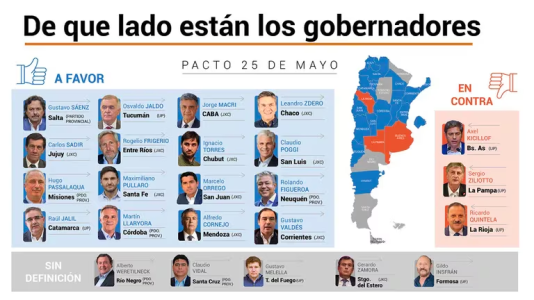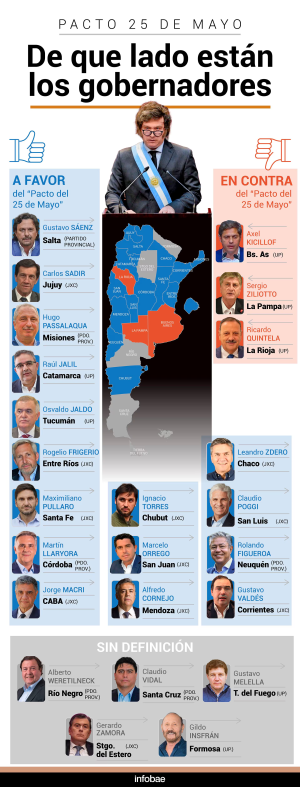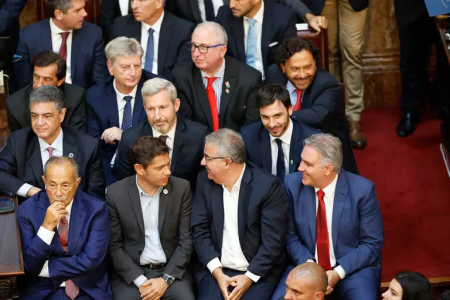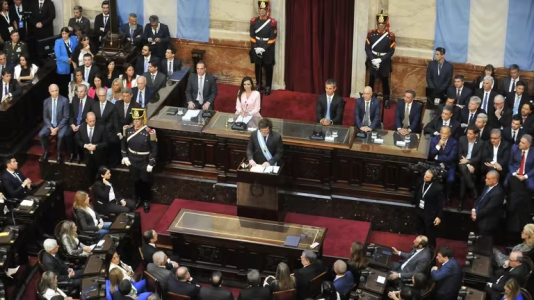Supports, rejections and doubts about the “May 25 Pact”: one by one, what is the position of the governors - Infobae

Source:

Apoyos, rechazos y dudas sobre el “Pacto del 25 de Mayo”: uno por uno, cuál es la posición de los gobernadores
La mayoría acudirá a las reuniones convocadas por el Gobierno. La apertura al diálogo de Javier Milei expone un cambio de estrategia. Desconfianza y pedidos de certezas en la mesa de negociación
March 06, 2024
The majority will attend the meetings called by the Government. Javier Milei's openness to dialogue exposes a change in strategy. Distrust and requests for certainty at the negotiation table
By Joaquín Múgica Diaz

Milei's opening signal was well received by governors across the political spectrum
Next Friday, at the Casa Rosada, Javier Milei has the opportunity to generate a break in the relationship that unites him with the governors of the entire country and that until now has been traumatic, regardless of the political flag or the flattery of the beginning of management. His main ministers will receive the majority of the leaders to begin negotiating the “May 25 Pact” , the political, social and economic agreement that the President announced at the opening of the ordinary sessions.
The call exposed a clear change in the strategy of the Head of State, who is now willing to open a channel of dialogue with the leaders and negotiate the approval of a new Omnibus Law, in exchange for a fiscal relief package for the provincial economies. It is a sign of openness, taking into account the aggressiveness and ferocity of the clashes in recent weeks.
The governors - regardless of the political party - will seek clarity about the pact that Milei wants to sign in Córdoba on May 25. “We are looking for concrete proposals and formal documents. “We want to avoid misunderstandings and broken phones ,” they indicated in one of the most populated provinces in the country. Definitions of promises and objectives.
In Balcarce 50 they assure that they are going to “listen” to the leaders and that they want to know their provincial realities, and then “negotiate.” “We want to reach an agreement to remove the most important part of the Base Law,” they indicated in one of the most influential offices of the Government House. This list includes the powers delegated to the President and the privatization of public companies, two of the sensitive points of the project that fell during its treatment in the Chamber of Deputies.

Who are the governors who support and those who reject the "May 25 Pact"
“Let's see what it is about. There are always things to improve, but the condition is that it is for the good of all. We hope there is no pressure and we can work well,” one of the governors with the most experience assured Infobae . There is distrust but a willingness to tone down the confrontation. There is an underlying political decision - apparently from both sides of the counter - to pacify the link that unites the national government with the provinces, and generate stability in management.
The Minister of the Interior, Guillermo Francos , said yesterday that, finally, there will be more meetings with governors, because some of them could not attend on Friday due to scheduling problems. It will be in stages. Two of them are Marcelo Orrego (San Juan) and Alfredo Cornejo (Mendoza), who are in Canada, where they attended the Prospectors & Developers Association of Canada (PDAC) fair, the largest in the world in mining matters. Both planned to send their lieutenant governors to represent them.
The people from San Juan and the people from Mendoza are part of a group of governors who endorse the “Pact of May 25” and who are predisposed to seek agreements in previous meetings, to put their signature on the document that would be presented in Córdoba within two months. . The majority of leaders support the pact, beyond the fact that they want to know its content in detail and have certainty about how their coffers will be recomposed after the adjustment, the removal of subsidies and the elimination of non-automatic transfers. They want to talk. They want to negotiate.
The list also includes Carlos Sadir (Jujuy), Gustavo Saenz (Salta), Leandro Zdero (Chaco), Osvaldo Jaldo (Tucuman), Raul Jalil (Catamarca), Martin Llaryora (Cordoba), Maximilian Pullaro (Santa Fe), Rogelio Frigerio (Entre Rios), Gustavo Valdés (Corrientes), Hugo Passalacqua (Misiones), Claudio Poggi (San Luis), Jorge Macri (Buenos City), Rolando Figueroa (Neuquen) and Ignacio Torres (Chubut).

The majority of the governors will go to the Casa Rosada next Friday to meet with the main ministers of Milei (ARGRA pool)
There are governors who do not close the door to the pact proposed by Milei and who will be in the Casa Rosada next Friday, as is the case of Alberto Weretilneck (Río Negro) and Gustavo Melella (Tierra del Fuego). Both were very tough on the Libertarian government last weekend, after the presidential speech on Friday night. They have a very tense relationship with the ruling party and what happens the day after tomorrow could improve it or, in the worst case, worsen it. It is a transcendent moment for the immediate future.
It may interest you:The Government awaits the meeting with the provinces to decide the content of the new Omnibus Law and the fiscal pact
In statements to Diario de Río Negro , Weretilneck said that the call “has the same form as a tightening . ” “'If you support this law, I will give you this money.' Stated like this, it sounds really ugly,” said the man from Rio Negro during the opening of the sessions in the provincial legislature, where he also considered that it is necessary for there to be “dialogue, consensus and agreements.” He marked his displeasure clearly and forcefully.
Meanwhile, Melella explained in an interview with a provincial radio station that the document “must include respect for the Constitution, federalism, the development of each province, retirees, workers and those who have the least.” And she clarified: “Those are axes from which no one can move.” She also criticized Milei's speech in Congress: “There were moments of great aggression and then a call for dialogue and consensus. "No more confrontations are needed . "
The two governors balance and avoid forceful definitions. They want to wait and, at the same time, they try not to fall into easy and systematic criticism to skip the call. Their public definitions place them in the waiting line, just like other governors, silence places them in the group of undefined people accustomed to winding roads. Those who do not want to break all bridges with the Casa Rosada but do not want to dilute their opposition profile either.
Also in the group of those who have not made a clear decision are Claudio Vidal (Santa Cruz), Gildo Insfrán (Formosa) and Gerardo Zamora (Santiago del Estero). The man from Formosa, a history of Peronism in the interior, had a very harsh speech with Milei at the beginning of the legislative year. He noted his discomfort but did not withdraw from the pact. Even his Minister of Economy will be present at this Wednesday's meeting at the Treasury Palace, where most of her colleagues from across the country will be.
“History teaches us that these types of neoliberal government plans end up resorting to violent methods to sustain themselves, due to their inevitable loss of consensus in the face of the damage they generate,” was one of the many critical definitions that Insfrán had in his speech. Zamora accepted the official invitation and will be at the Casa Rosada on Friday. The man from Santiago is one of the most flexible and pragmatic governors of Unión por la Patria (UP).

Last Friday Javier Milei called on the governors to sign the "Pact of May 25" (Gustavo Gavotti)
Silence is a political position protected in a practical sense. Waiting and knowing how to manage times in a turbulent context, where the economic situation is critical but, at the same time, the President retains an important level of public support. The result of this account - unthinkable for many Peronists who believe that as the weeks go by, Milei's support will disintegrate - makes some time-serving governors uncomfortable.
Only three leaders harshly rejected the “May 25 Pact”: Axel Kicillof (Buenos Aires), Sergio Ziliotto (La Pampa) and Ricardo Quintela (La Rioja). They are all part of UP. “Milei has to stop extorting governors to approve laws,” said the Buenos Aires governor. “If the President does not comply with the laws, how are we going to reach a new pact?” the man from Pampa asked himself. “They want to subdue you. There is a State that does not work. It is impossible to move forward if they make it a condition for you to support a law that cannot be supported,” said the Rioja native, regarding the demand to support a new Omnibus Law.
If the Government does not know how to contain the governors who look askance at the call and does not make a specific formal proposal, it is likely that the group of three will expand. To a large extent, it will depend on the offer Milei's ministers make and what they ask for in return. And also how far the governors are willing to support the new bill that the ruling party needs so much and that was blocked by most of the opposition a couple of weeks ago in the Chamber of Deputies.
Until now Francos has been a key player in restoring dialogue with the governors. In the Casa Rosada it is already known that the Minister of the Interior fixes what the President breaks. But Milei went too far in attacking and disqualifying him, and the atmosphere became heated. It was Francos who began the negotiation with five governors to open the way towards the pact proposed by the president, and coordinate a negotiating table where give and take is not reviled. His political wrist will be decisive in maintaining the axis of the conversation.
At the end of the week there will be a new chapter in Milei's relationship with the governors, after endless accusations, threats and chicanery. Of the 24, there are 16 who are willing to support the pact, three who rejected it and five who are waiting for clearer definitions in the negotiation that the President proposed to open, in search of governability and after an unlimited escalation that opened deep wounds that no longer exist. They will heal easily.

